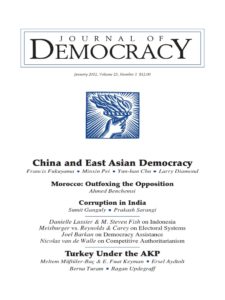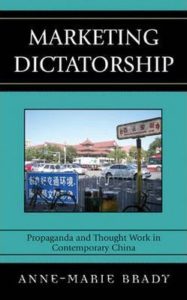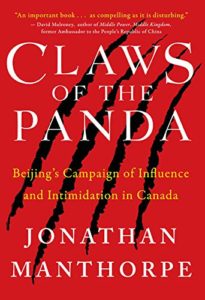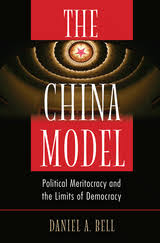‘Claws of the Panda’: China model going backwards?
Democracy Digest, February 25, 2019
Chen Tianyong, a Chinese real estate developer in Shanghai, boarded a flight to Malta last month with no plans to return anytime soon. After landing, Mr. Chen, a former judge and lawyer, shared on social media a 28-page article explaining himself. “Why I Left China,” read the headline, “An Entrepreneur’s Farewell Admonition,” the New York Times reports:
Many members of the business elite are unhappy that the leadership’s economic policies favor state-owned enterprises even though the private sector drives growth. They are angry that the party is trying to put a Mao-era ideological straitjacket on an economy driven by private enterprises and young consumers. They are upset that the party eliminated term limits last year, raising the prospect that Mr. Xi could become president for life.
 “The most important cause of their pessimism is bad policy and bad leadership,” said Minxin Pei, a professor at Claremont McKenna College [and contributor to the NED’s Journal of Democracy] who is in frequent contact with business figures. “It’s clear to the private businesspeople that the moment the government doesn’t need them, it’ll slaughter them like pigs. This is not a government that respects the law. It can change on a dime,” he told the Times.
“The most important cause of their pessimism is bad policy and bad leadership,” said Minxin Pei, a professor at Claremont McKenna College [and contributor to the NED’s Journal of Democracy] who is in frequent contact with business figures. “It’s clear to the private businesspeople that the moment the government doesn’t need them, it’ll slaughter them like pigs. This is not a government that respects the law. It can change on a dime,” he told the Times.
Since Mr Xi took power in 2013, China has in some ways gone backwards, the Economist observes:
As our essay this week explains, two decades ago it was possible, even sensible, to imagine that China would gradually free markets and entrepreneurs to play a bigger role. Instead, since 2013 the state has tightened its grip. Government-owned firms’ share of new bank loans has risen from 30% to 70%. The exuberant private sector has been stifled; its share of output has stagnated, and firms must establish party cells which then may have a say over vital hiring and investment decisions.
 There is mounting concern generally about China’s influence campaigns in countries like Canada, much of it executed through the United Front Work Department, a secretive offshoot of the Chinese Communist Party (CCP) known to work with ethnic Chinese organizations overseas, the Calgary Herald adds:
There is mounting concern generally about China’s influence campaigns in countries like Canada, much of it executed through the United Front Work Department, a secretive offshoot of the Chinese Communist Party (CCP) known to work with ethnic Chinese organizations overseas, the Calgary Herald adds:
According to its website, the Vancouver-based United Association of Women and Children has 1,500 members, branches in several provinces and a focus on equal treatment and work opportunities for women — but it lists no contact information. Two B.C. leaders of the non-profit sector dedicated to helping women in business — Laurel Douglas of the Women’s Enterprise Centre and Lisa Niemetscheck of WebAlliance — told the National Post they had never heard of it.
 The group seems to have “all the hallmarks” of a front organization to further Beijing’s interests, says Jonathan Manthorpe, whose just-published book, Claws of the Panda, documents China’s influence campaigns.
The group seems to have “all the hallmarks” of a front organization to further Beijing’s interests, says Jonathan Manthorpe, whose just-published book, Claws of the Panda, documents China’s influence campaigns.
“Establishing fake civil society NGOs is an established modus operandi” of the United Front, said Charles Burton, a Brock University professor and former Canadian diplomat in Beijing.
Thanks to blockchain, internet users have achieved some victories in the fight against China’s strict internet censorship, notes Nir Kshetri, Professor of Management at the University of North Carolina – Greensboro. A historic moment occurred when Peking University‘s former student, Yue Xin, penned a letter detailing the university’s attempts to hide sexual misconduct. The case involved a student, Gao Yan, who committed suicide in 1998 after a professor sexually assaulted and then harassed her, he writes for the Conversation:
The letter was blocked by Chinese social networking websites, but an anonymous user posted it on the Ethereum blockchain. In another case, in July, Chinese citizens used blockchain to preserve an investigative story which condemned inferior vaccines being given to Chinese babies. …A blockchain is a secure database that’s stored in a distributed set of computers. Every addition to the database must be digitally signed, making clear who’s changing what and when.
 Increasing Chinese leadership in the Middle East is served by a growing interest among the region’s states to pursue the “China Model” at the expense of the “Washington Consensus” that has traditionally defined foreign economic presence in the region, analyst Nicholas Lyall writes for the Diplomat:
Increasing Chinese leadership in the Middle East is served by a growing interest among the region’s states to pursue the “China Model” at the expense of the “Washington Consensus” that has traditionally defined foreign economic presence in the region, analyst Nicholas Lyall writes for the Diplomat:
The China Model – characterized by a strictly controlled political arena, as well as state control of the economy’s commanding heights, accompanying market capitalism – resonates significantly with Middle Eastern governments. Despite the fact that Middle Eastern regimes have largely proven incapable of achieving the state capacity, industrialization, and institutional structures imperative to the success of the China Model, the appeal of Beijing’s economic alternative is likely to remain a source of Chinese soft power that consolidates its economic influence vis-à-vis the US in the Middle East.
